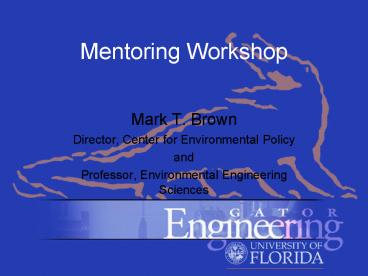Mentoring Workshop - PowerPoint PPT Presentation
1 / 13
Title:
Mentoring Workshop
Description:
starts the day a student enters the research group. continues as they develop ... after graduation, help students locate potential employment opportunities and ... – PowerPoint PPT presentation
Number of Views:35
Avg rating:3.0/5.0
Title: Mentoring Workshop
1
Mentoring Workshop
- Mark T. Brown
- Director, Center for Environmental Policy
- and
- Professor, Environmental Engineering Sciences
2
Outline
- Mentor as Advocate
- Mentor as Coach
- Mentor as Friend and Colleague
- Mentor as Listener
- Mentor as Manager
- Graduate Students as Mentors
- Summary
3
Mentor as Advocate
- Advisors are crucial as advocates
- starts the day a student enters the research
group - continues as they develop their research,
publish, and attend conferences - after graduation, help students locate potential
employment opportunities and letters of
reference. - make sure they advance in their careers by
keeping in touch and supporting when and where
possible
4
Mentor as Coach
- Coaching provides empowerment and support
- to seek change, to be focused, and to proceed
with their research (and life) with vigor. - to help each student first identify their goals
and then to map out a strategy to achieve them - to help define both their short term and long
term goals - to provide the structured opportunity for each
student to reflect and make course corrections. - to help students balance work, family and social
demands
5
Mentor as Friend and Colleague
- Friendships are a natural outgrowth of most
long-term relationships - students can gradually become our colleagues.
- strive for objectivity in giving fair grades and
evaluations, but at the same time treat them as
research colleagues, - In the end, having our students succeed and
become a friend and colleague is most important
and one of our great joys.
6
Mentor as Listener
- A great deal of time is spent listening
- Beyond professional listening, we must also
hear at other levels and with other ears. - be aware of each students position and particular
challenges - develop a feeling of empathy for each students
circumstances - develop clear communication and a felling of
mutual trust
7
Mentor as Manager
- Develop and maintain a CoP
- organized our labs so everyone knows what
everyone else is doing - meet every week in round-table to discuss each
students research - build a sense of team spirit and camaraderie over
multiple years and cohorts of students
Community of Practice - the process of social
learning that occurs and shared sociocultural
practices that emerge and evolve when people who
have common goals interact as they strive towards
those goals
8
Graduate Students as Mentors
- We learn by doing
- support our students in developing their teaching
and management skills. - encourage their participation in hiring,
training, and supervising lab and field
assistants - more experienced students mentor new students
- with out teaching experience they do not have all
the equipment necessary to succeed.
9
Summary 1.
- I asked my studentsWhats needed in a mentor?
10
Summary 2.
- Professor should
- Realize the difference between Masters and Phd.
- Recognize the differences in each student
- Catalyze studentsprod without pushing
- Facilitate group think, group involvement, a CoP
- Be Available!
- Set up, early on, that constructive critiques are
part of the process
11
Summary 3.
- Professor should recognize
- A student needs to know what kind of advisor they
need. - Students need to know up front, what style
mentor they may be working with. Faculty should
have a web page that describes their style. - In the beginning, spend extra time so that
student can judge the relationship. - Early on, students should know they can change
major professor
12
Summary 4.
- Professor should
- Help students to look beyond what they are doing
right now. Understand the system that they are a
part of, ground them in the science, in the
community. - Remind students they are going to growthis is a
learning processits about getting better at
proposals, at writing, at presenting. - Foster opportunities for students to travel and
present at meeting, and with other professional
experiences.
13
Summary
My approach to mentoring incorporates the belief
that the best teaching is through action,
contact, and example. inspire students light a
fire in their bellies provide a context for
developing an awareness of who and where they
are. provide the opportunity to grow and develop
as scientists and engineers, and insure we have
the atmosphere in which it can take place.































